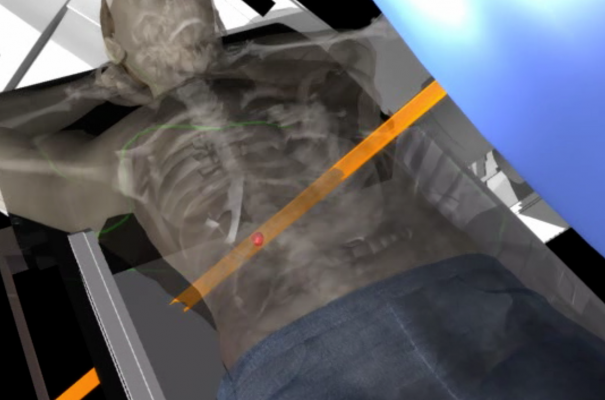
May 19, 2015 — Two studies from Johns Hopkins Kimmel Cancer Center add to preliminary evidence that stereotactic body radiotherapy (SBRT) appears as safe and effective as standard radiation treatment for certain patients with pancreatic cancer whose tumors are advanced but have not spread.
The studies also suggest, the researchers say, that SBRT may have some advantages over traditional radiation for some patients; this is because doses can be delivered over the course of one week, unlike six or seven weeks with standard radiation therapy. Some patients also reported significantly less pain and no significant decrease in their quality of life after SBRT, the scientists found.
Overall, the two studies show that SBRT for locally advanced pancreatic cancer "appears to be at least as good as standard radiation, and in some cases, it appears to be better," said Joseph Herman, M.D., M.Sc., co-director of the Johns Hopkins Pancreatic Cancer Multidisciplinary Clinic. He cautioned, however, that the results need to be confirmed in randomized trials.
Conventional or standard radiation is delivered in relatively low doses, usually daily over the course of several weeks. SBRT uses a higher dose of carefully targeted radiation to treat tumors, delivered all at once or in a few "fractionated" doses.
The researchers report that patients experienced minimal gastrointestinal side effects, such as ulcers and intestinal inflammation, when SBRT is delivered in five separate, fractionated doses, rather than one large dose. In one prospective, multicenter study of 49 patients who received the five doses, five patients developed one of these toxic side effects, compared to nine of 16 patients (47 percent) of those who received the one-dose SBRT regiment in a previous study.
In some cases, patients were able to have their tumors surgically removed with few or no cancer cells left behind, said Herman. Before treatment with chemotherapy and SBRT, these patients were thought to have tumors unsuitable for surgery.
"The majority of patients we treat with stereotactic radiation have tumors that cannot be safely or effectively removed by surgery, and therefore their average survival is only about a year," Herman said. "So if five days of stereotactic radiation has outcomes equivalent to the six weeks of standard chemotherapy and radiation, then patients can spend less time receiving treatment and more time at home with their families."
Herman says the shorter treatment duration with SBRT could also give patients quicker access to full-dose chemotherapy. The long duration of standard radiation may delay full-dose chemotherapy, potentially giving cancers more time to spread.
The study, published April 1 in the journal Cancer by Herman and his colleagues, included 49 patients with locally advanced pancreatic cancer treated at The Johns Hopkins Hospital, Stanford University and Memorial Sloan Kettering Cancer Center. The patients received SBRT in five fractionated doses, and chemotherapy with gemcitabine before and after the radiotherapy.
Four weeks after SBRT, all 22 patients who completed a quality of life questionnaire reported an eight-point reduction in pain from a baseline measure of 25, and their quality of life stayed the same, which Herman said is encouraging.
In a second study, published January 2015 in the Annals of Surgical Oncology, Herman and his colleagues analyzed information on patients with pancreatic cancer who received SBRT and chemotherapeutic drugs at The Johns Hopkins Hospital between 2010 and 2014. Of 88 patients, eight experienced severe gastrointestinal side effects, and 19 with tumors previously considered inoperable were able to have surgery after SBRT.
Pancreatic tumors can cling and grow around blood vessels, making them especially difficult to remove. "After we irradiate it with SBRT, the tumor changes to a form that can be more easily pried away from the vessel," Herman said.
SBRT isn't for all patients with pancreatic cancer, he warned. People who have tumors larger than 8 centimeters in diameter or a little over 3 inches, or have a tumor that is invading the area of the bowel or the stomach, usually can't get SBRT because of the risk to normal tissues.
Herman said he plans to work with other clinicians and scientists to test combinations of SBRT with therapies that help the immune system fight cancer more effectively, such as a Johns Hopkins-developed experimental pancreatic cancer vaccine.
For more information: www.hopkinsmedicine.org


 January 30, 2026
January 30, 2026 









